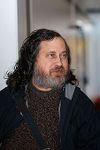Portal:ICT Literacy
ICT Literacy
Karnataka Government Computer Literacy Test (CLT) syllabus and resource materials are available here.
ICT literacy has many aspects
- Understanding how ICT impacts society along socio-cultural, political and economic dimensions
- Understanding how ICT impacts education - both education system and teaching-learning processes
- Building skills in using ICT platforms, tools and resources
- Building skills in participating in ICT platforms, collaboratively creating tools and resources
The ICT literacy portal will discuss some of these aspects
Public Software
Software can be considered as the a basic building block of participation in today's digital society. Access to software is essential for everyone to participate in the digital economy and the future world at-large. Software that is produed by a community of users which can be freely shared, modified and updated as necessary provides possiblities for access and participation. Such a software is called Public Software, also known as free software or open-source software.
The term public software emphasizes the public nature of its ownership and control, which are important factors for ensuring universal access and supporting participation in its creation and modification. In a society that is becoming more digtial, access to software resources is important for meaningful participation and therefore should be seen as a right. Such an availability of software resources offers huge possibilities for constructive learning. read more
Technology News
Book Shelf
Events and Happenings
Categories
Explore A Software
ICT Integration in Education Handout
Tutorials and Manuals to learn public software tools
Manuals
Videos
- Spoken Tutorials Project from MHRD - Download videos on popular public software applications for self learning
- Tux Typing
Videos on Educational applications
Websites of educational applications
ICT@Schools
Useful resources
Internet Safety
While the Internet can be a very useful space to get information and download resources and also communicate with others, it can also be an unsafe space. As adults, teachers need to be aware of basic methods for protecting themselves while using the Internet and also help the students understand these rules. Many sites discuss Internet safety Internet Safety - UNESCO Newsletter
Ireland Department of Education has done a lot of work in this area and has many sites with information on Internet safety
